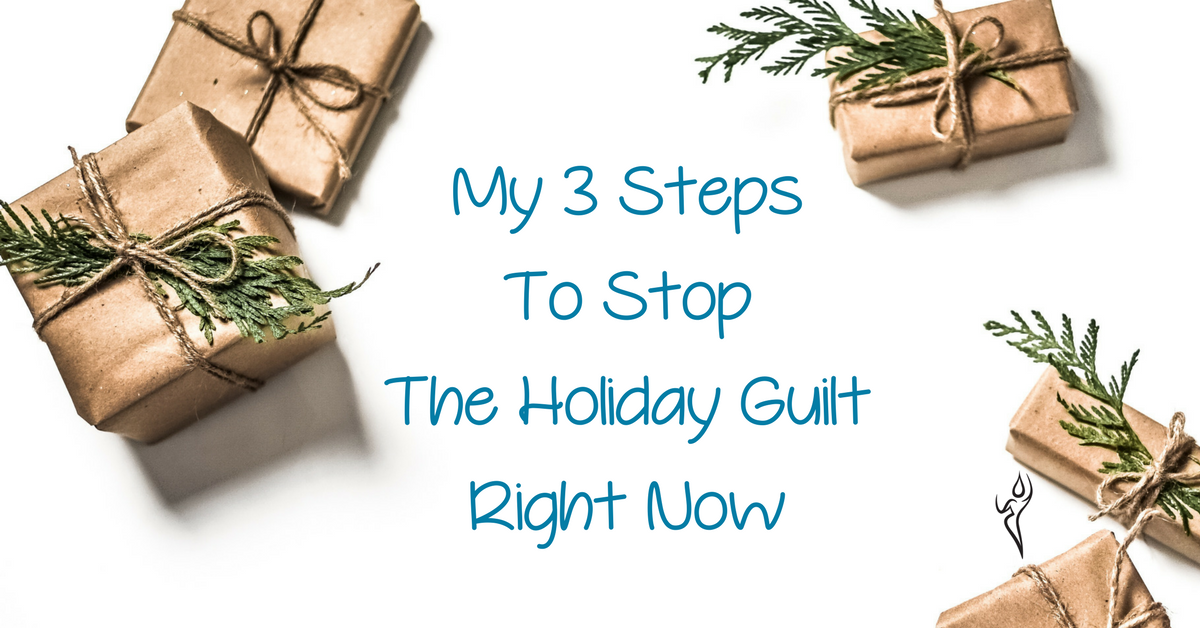The holidays are just around the corner, and we celebrate them by enjoying delicious treats. We don’t want to miss out on all of the festivities. The temptation is everywhere! Here are my 3 steps to stop holiday guilt right now!
First are the office parties, and then the treats everyone brings to share. They sit in the kitchen, tempting you whenever you need to refill your water or get a cup of coffee. Finally, they call your name, even when you are not in the room.
You cook an elaborate meal for your family, but you have to taste everything before serving it. So you’re already full when you sit at the table, but you still have to eat with the rest of the family! Then you visit friends and don’t want to disappoint them, so you at least try all of the delicacies they made.
Your waistline is already growing, and the pants are getting tighter. On top of that, you feel lethargic because of all the sugar, fat, and extra alcohol, and to top it all off, you are not exercising as much as you usually do.

Already you feel guilty and disappointed about your lack of self-control. You think, “Darn it, there goes some of the milestones I reached!” You almost lost all the weight you planned to lose at the beginning of the year. You had your nutrition and exercise program under control…until now.
But wait, you notice that “help” is on the way everywhere you look. You read about these “quick weight loss” programs: the bulletproof diet and the juice cleanses. These diets offer to shock your system into losing the weight you gained during the holidays. Your friend offers to sign you up for her diet group. Phew saved, and you continue eating.
Reasons That Trigger Our Holiday Guilt
Feeling guilty during the holidays can stem from a variety of reasons. Here are some common factors that may contribute to holiday guilt:
- Unmet expectations: The holidays often come with high expectations of creating perfect, joyous experiences. When reality falls short of these ideals, it can lead to feelings of guilt for not meeting the perceived standards.
- Family dynamics: Family gatherings can be a source of both joy and stress. Conflicts, strained relationships, or unresolved issues within the family can trigger guilt, especially if you feel responsible or accountable for the situation.
- Financial pressure: The holidays can be financially demanding, with expectations of buying gifts, hosting parties, or participating in various activities. If you struggle with budget constraints or feel unable to provide as much as you would like, it can lead to guilt.
- Comparison and social media: Social media platforms often showcase the highlight reels of people’s lives, especially during the holidays. Constantly comparing yourself to others and feeling inadequate or envious can contribute to guilt and self-doubt.
- Neglected self-care: The holiday season can be busy and overwhelming, leaving little time for self-care and personal well-being. Neglecting your own needs and feeling guilty for taking time for yourself can contribute to emotional strain.
- Unresolved grief or loss: Holidays can magnify feelings of grief or loss, especially if you’ve experienced the death of a loved one or significant life changes. Guilt may arise from not being able to fully engage in the festive spirit or feeling guilty for experiencing moments of joy.
- Overcommitment and time management: The holiday season tends to be packed with events, obligations, and social engagements. If you find yourself overcommitted or struggling to manage your time effectively, it can lead to guilt for not being able to fulfill all the expectations or obligations.
- Cultural or religious expectations: Cultural or religious traditions may come with specific expectations and customs during the holidays. If you deviate from these traditions or feel disconnected from your cultural or religious background, it can trigger feelings of guilt.
You know that this coming year it will work, right?! So this year, you keep all those crazy rules. Instead, you hope that the diet you picked will work for you and get that weight off quickly.
You know what I say? Stop dieting!

Stop feeling like a failure because you can’t stick with them. Don’t try another fad diet and be disappointed yet again.
What if there was a better way than dieting?
What if I didn’t have to feel guilty during the holidays?
What if you did not set yourself up for disappointment every year?
I am not saying throw caution to the wind and go for it. Instead, I suggest solutions to change unhealthy thinking habits and take control of your life and the holidays.
3 Steps To Stop Holiday Guilt Right Now
# 1 Gauge your desire
Don’t just go for it. Wait a moment and think about what you will put into your body. Be clear on how important the food is to your health. Ask yourself: Why am I eating this? Is it right for my body? Does it give me energy?
# 2 Assess Your Brain Message
Is your brain telling you that you can’t live without eating this treat? The brain plays tricks on us when it comes to smell and specific food colors (shades of red signal your brain to eat, it’s why all those fast food places you love are painted red/orange/yellow!) Stop before you follow your brain. Slow down and assess what you’re about to eat (and eat in moderation!). You know what you are doing if you think about it.
# 3 Refocus Your Attention
Redirect your focus on healthy nutrition patterns. Instead, focus on wholesome and productive activities, despite false urges. Make the best choices you can, given the situation. For example, focus on how delicious a salad, dressing on the side, tastes and its satisfying crunch.
You may not make the perfect choices during the holidays, and that’s okay. But you don’t need to feel deprived or disappointed by the end of December.
How To Stop The Holiday Diet Culture On Its Tracks
- Challenge societal norms: Recognize that diet culture is deeply ingrained in our society and often perpetuates unrealistic body standards and harmful relationships with food. Challenge these norms by promoting body positivity, self-acceptance and embracing diverse body shapes and sizes.
- Shift the focus: Instead of putting the emphasis on restrictive eating or weight loss during the holidays, shift the focus to celebrating and enjoying the company of loved ones. Place importance on creating meaningful connections, fostering gratitude, and engaging in activities that promote well-being and joy.
- Promote intuitive eating: Encourage a healthy and balanced approach to eating by promoting intuitive eating principles. Encourage listening to one’s body cues, eating mindfully, and honoring hunger and fullness signals. Encourage individuals to trust their bodies’ wisdom in making food choices that nourish and satisfy them.
- Discourage body shaming: Create a supportive and inclusive environment where body shaming is not tolerated. Encourage positive body image and discourage negative comments about one’s own body or others’ bodies. Emphasize that everyone deserves respect, regardless of their size or appearance.
- Reject “good” and “bad” food labels: Avoid labeling foods as “good” or “bad” as it reinforces a negative relationship with food. Encourage a balanced and flexible approach to eating, allowing for all types of foods in moderation. Promote the concept of food as nourishment, pleasure, and enjoyment rather than a source of guilt or punishment.
No need to try another crash diet at the beginning of the year. You will not feel disappointed about your lack of self-control because you choose what suits you.

Pingback: 7 Ways To Fight The Holiday Stress
Comments are closed.